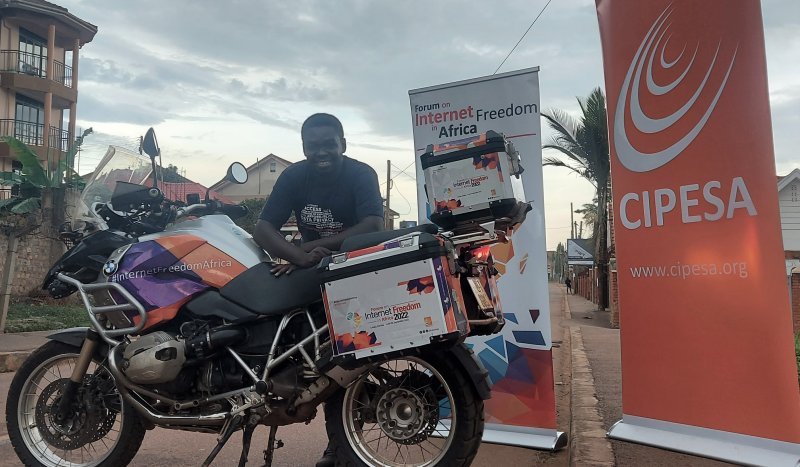By FIFAfrica22 |
The distance between Kampala, Uganda and Lusaka, Zambia is approximately 3,300 kilometres by road. As part of a road trip to the Forum on Internet Freedom in Africa 2022 (FIFAfrica22), Ugandan digital security expert Andrew Gole will travel between the two countries over 28 days on his motorbike, making multiple stops to impart tips and advice on digital security.
Gole’s trip will take him through Uganda before crossing into Rwanda, Tanzania, Malawi, and finally to the FIFAfrica22 host country Zambia. The return trip will include stops in Tanzania, Zanzibar and Kenya. Gole will interact with human rights organisations and communities along the way in addition to human rights organisations on the value of securing devices and communications as a means of protecting their digital rights.
“Through my work with various communities, I have seen the positive impacts and benefits of digital security,” noted Gole who has done extensive work skilling users across the region, including through the Level-Up programme. “Pair this [expertise] with a bike and the places I can go and people I can reach are unlimited,” says Gole. He has previously completed road trips across Uganda addressing the digital security concerns of rural-based civil society organisations.
“Everyone is heading in the direction of the digital ecosystem. Everyone will be in it. If we do not address some of the challenges people are facing now, we will have a generation of people using systems without knowing the risks present online. We all need it. We need to future-proof the internet experience.” Noted Gole who revealed that some people are self-taught but still lack some important capacities when it comes to securing their personal or organisational online security concerns.
Gole’s Digital Security on Wheels initiative was founded in 2020 when much of the world was at a near standstill due to the Covid-19 pandemic. In Uganda, private and public transportation was limited, yet digital security concerns went on the rise due to the increased reliance on digital communication. Recognising the digital security gap in areas outside the capital, Gole embarked on a journey to the Eastern and Northern regions of Uganda. What started off as a 14-day trip ended up being a 21 day trip due to the extensive digital security needs of the various organisations he went to engage.
“Some problems simply couldn’t be solved in the short amount of time available. I had to extend my stay with eth organisations to address their problems, otherwise the effort would be meaningless.”
At FIFAfrica22, Gole will join the multi-lingual (English, French, Swahili, Arabic) Digital Security walk-in clinic/help desk, which comprises Access Now, the Collaboration on International ICT Policy for East and Southern Africa (CIPESA), Digital Society of Africa, Encrypt Uganda, Internews, Greenhost, Jigsaw (a technology incubator created by Google), Defend Defenders and Zaina Foundation. The Hub will allow FIFAfrica22 participants to access new innovative Internet freedom technology, privacy and data protective tools, measures and platforms in order to respond to their emergent digital security concerns. It will also offer immediate support and demos of various digital security tools and advisory on improving organisational security and resilience against threats and dangers when working, engaging, socialising and organising online.
Elsewhere at FIFAfrica22 digital security experts will participate in skills-sharing workshops and panel discussions. Sessions include: Utilizing Collaborative Digital Resilience Mechanisms for Efficient Rights Protection and Advocacy in growing IOT Society hosted by the entities running the walk-in clinic/help desk; South-to-South Peer Learnings on Digital Resilience for Social Justice hosted by the Global Network for Social Justice and Digital Resilience; , Privacy and Anonymity Online hosted by the Tor Project and Usability Design and Developing Scenario Personas for Digital Rights Tools hosted by La Poiema.
Meanwhile, FemTech-Africa, an Internews pilot programme will host a feminist digital security exhibition to showcase gendered approaches to digital security. The exhibition will provide similar services as the digital security clinic but with a focus on behavioural change and strategies for online safety specifically for women human rights defenders and journalists. Women human rights defenders (WHRDs) and journalists face peculiar internet freedom challenges, such as trolling, cyberbullying and other forms of online violence against women, which have far-reaching impacts on their safety and on rights protection, not least free expression and democratic participation.
The exhibition will disseminate safety guide comic series and online safety for women booklets localised in up to five languages. The exhibition will feed into the panel discussion on women’s rights online including on Resistance & Connection: An African Feminist Perspective for Decolonising the Internet.
In 2020 and 2021, the hybrid formats of FIFAfrica also featured digital security components. At FIFAfrica20, a digital security and risk assessments workshop was held for investigative journalists and human rights activists in Kinshasa, Democratic Republic of Congo. In addition, a multilingual (English, French and Arabic) digital security hub provided virtual digital security support through a chat widget, email or messaging during the three days of FIFAfrica20. The virtual digital security hub was also run during FIFAfrica21.
Be part of the online conversation using #FIFAfrica22 and share your vision for #InternetFreedomAfrica! | Follow @cipesaug on Facebook, Twitter, LinkedIn
Visit the event website
About FIFAfrica
The Forum on Internet Freedom in Africa (FIFAfrica) is an annual landmark event which convenes a spectrum of stakeholders from across the internet governance and digital rights arenas in Africa and beyond. Hosted by the Collaboration on International ICT Policy for East and Southern Africa (CIPESA), the Forum offers a platform for government representatives, civic actors, journalists, policymakers and technologies to engage in the latest developments and trends in technology policy and digital rights.

